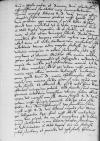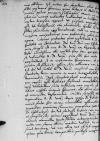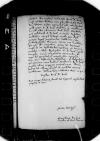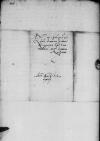Letter #2417
Stanisław HOZJUSZ (HOSIUS) to Ioannes DANTISCUSVilnius, 1541-04-22
| received Seeburg (Jeziorany), 1541-04-30 Manuscript sources:
Prints:
| ||||||
Text & apparatus & commentary Plain text Text & commentary Text & apparatus
Reverendissimo in Christo Patri et Domino, domino
Reverendissime in Christo Pater et Domine, domine colendissime.
Officiosissimam servitutis meae commendationem.
Ternas accepi... illegible⌈...... illegible⌉ litteras Reverendissimae Dominationis Vestrae. Primis officio fungitur supervacaneo gratias mihi agendi, quasi vero gratiam ego merear, si quod debeo, id facio. Quod vero postulat, ut in
Per famulum suum misit mihi Reverendissima Dominatio Vestra litteras  BCz, 1618, p. 400 mei oblitum. Est autem hoc ferendum plus haberi hidden by binding⌈[eri]eri hidden by binding⌉ fidei postremo homini, quam litteris
s(erenissimae) or s(acrae)⌈s(erenissimae)s(erenissimae) or s(acrae)⌉
BCz, 1618, p. 400 mei oblitum. Est autem hoc ferendum plus haberi hidden by binding⌈[eri]eri hidden by binding⌉ fidei postremo homini, quam litteris
s(erenissimae) or s(acrae)⌈s(erenissimae)s(erenissimae) or s(acrae)⌉
Mirum ni nos hidden by binding⌈[s]s hidden by binding⌉ istorum mores nolentes volentes in Lutheri castra transire cogant. Ut quisque improbissimus hidden by binding⌈[us]us hidden by binding⌉ est, ut levissimus, ita plurimum habet in urbe hidden by binding⌈[be]be hidden by binding⌉ fidei, plurimum existimationi written over e⌈eii written over e⌉s. Sed me meae certe hidden by binding⌈[te]te hidden by binding⌉ magnae occupationes non patiuntur pluribus agere.
Litteras patentes, quas postulavit Reverendissima Dominatio Vestra, habebit iis adiunctas. De reverendissimo
Audio scripsisse  BCz, 1618, p. 401 solebant. De constanti voluntate Reverendissimae Dominationis Vestrae mihi quidem dubium non est, sed neque reverendissimo domino. Utinam autem aequae sint alii constantes, quod opera Reverendissimae Dominationis Vestrae confectum iri confidimus, cui soli fidit plurimum reverendissimus dominus. Mandata, quae postulavit Reverendissima Dominatio Vestra in causa Holstein, mittuntur. Arresti litteras curabo ego domino Georgio Hegel perferendas.
BCz, 1618, p. 401 solebant. De constanti voluntate Reverendissimae Dominationis Vestrae mihi quidem dubium non est, sed neque reverendissimo domino. Utinam autem aequae sint alii constantes, quod opera Reverendissimae Dominationis Vestrae confectum iri confidimus, cui soli fidit plurimum reverendissimus dominus. Mandata, quae postulavit Reverendissima Dominatio Vestra in causa Holstein, mittuntur. Arresti litteras curabo ego domino Georgio Hegel perferendas.
Valde iam sum scribendo fessus. Novarum rerum non multum hic est. Fui occupatior, quam ut vacaret mihi de iis describendis cogitare. Si tempus patietur, mittam descriptum Reverendissimae Dominationi Vestrae, quod corrasero.
Cuius me gratiae commendo et rogo, ut ignoscat, si minus sum copiosus, sum enim vehementer fatigatus et detentus est opinione mea diutius veredarius Reverendissimae Dominationis Vestrae propter alias magnas occupationes.
Deum precor, ut illam servet in multos annos incolumem.
Eiusdem Reverendissimae Dominationis Vestrae servitor deditissimus
Postscript:
Has meas litteras simul ut legerit, conscindat, quaeso, Reverendissima Dominatio Vestra.



